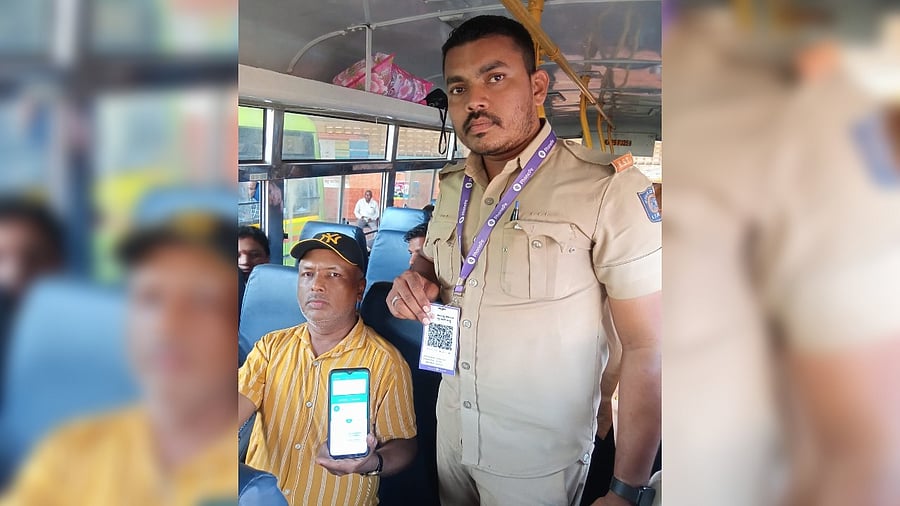
A commuter onboard a bus of the Hubballi rural division of NWKRTC makes a payment via UPI.
Credit: DH File Photo
Huballi: Three of the four state-run road transport corporations are clocking 10% to 30% of their daily revenue collection through the Unified Payments Interface (UPI) mode of payment. According to officials, this is steadily increasing.
Issuing of tickets and payment on digital mode is making commuting easy for passengers and helping the administration plug pilferages, collect real-time revenue from corporations and avoid cash handling charges to banks and the change problem.
Karnataka State Road Transport Corporation (KSRTC) started the on-the-spot digital payment system in November and has been reporting payments amounting to an average of Rs 50 lakh (20% to 30% of its daily ticketing transactions) being made through UPI per day.
North Western KRTC, the first corporation to introduce issuing of tickets through QR codes in all its 4,159 buses, is collecting 9% to 10% of its ticket issuance through digital payment, while Bengaluru Metropolitan Transport Corporation (BMTC) that has been issuing tickets through digital payment since 2021 gets nearly Rs one crore (or 10%) of its daily revenue through digital payment.
BMTC, since 2021, has recorded 2.14 crore transactions and received nearly Rs 150 crore via digital payments.
Kalyana Karnataka RTC (KKRTC) is yet to introduce digital payment system in its jurisdiction. Though it had a pilot project of issuing tickets through QR code mode a few months ago, it has stopped doing so now.
KKRTC plans to reintroduce it next month by introducing improved electronic ticket vending machines.
Smart ETMs
“To make it foolproof, we have decided to go the KSRTC way by introducing smart ETMs with the latest Android version of the operating system,” says M Rachappa, managing director of KKRTC.
On average, KSRTC issues tickets worth Rs 13 crore every day in its nearly 9,000 buses.
Of this, digital payments account for Rs two crore, including Rs 1.5 crore through online booking and Rs 50 lakh via UPI mode. As much as 60% to 70% of their tickets are issued either under Shakthi scheme or students & other concession passes.
Real-time transactions
“The digital transactions are making a huge difference to the corporation. Through the dynamic ticketing system that is installed in ETMs, we can monitor real-time transactions,” says KSRTC MD V Anbukkumar.
He says the holistic approach of the ETMs makes it easy for passengers to pay through debit/credit cards, UPI or any other mode. So, digital payments will increase in the coming days.
He says ETMs are equipped to handle even the proposed National Common Mobility Cards.
Priyanga M, MD of NWKRTC, says there has been a steady increase in digital payments in her corporation.
“Currently, digital payment is through QR code mode and soon, we will shift to ETMs,” she said.
Since November 1, 2023, NWRTC completed 70.15 lakh transactions and collected Rs 65.05 crore in digital payments.